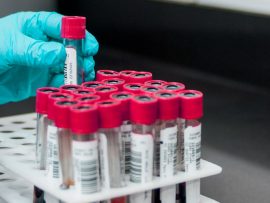Abstract Objectives To determine whether heparin resistance (HR) occurring during (CPB) is associated with (antithrombin III) activity. Design Retrospective review of data collected prospectively in a single center. Setting A tertiary referral..
Read MoreAbstract Objectives Antithrombin (AT) deficiency is considered the primary cause of heparin resistance (HR); however, some patients with HR have normal AT activity (AT-independent HR). Supplementation with concentrated human AT..
Read MoreAndexanet Alfa–Associated Heparin Resistance in Cardiac Surgery: Mechanism and In Vitro Perspectives
Abstract BACKGROUND: Andexanet alfa (andexanet) is the only Food and Drug Administration–approved antidote for direct FXa (factor Xa) inhibitors but has been reported to cause resistance to unfractionated heparin (UFH)...
Read MoreAbstract The term heparin resistance is likely best defined as the failure of an appropriate dose of unfractionated heparin (UFH) to achieve a predetermined level of anticoagulation. Unfortunately, and despite..
Read MoreAbstract Heparin resistance (HR) is observed before cardiopulmonary bypass (CPB), despite with normal antithrombin III (AT-III) levels. The relationships between preoperative AT-III activity and activated clotting time (ACT) after the..
Read MoreAbstract Since the risk factors for heparin resistance (HR) before cardiopulmonary bypass (CPB) have not been fully clarified, this study investigated the contributing factors for HR after the initial unfractionated..
Read MoreAbstract Ensuring adequate anticoagulation for patients requiring cardiac surgery and cardiopulmonary bypass (CPB) is important due to the adverse consequences of inadequate anticoagulation with respect to bleeding and thrombosis. When..
Read MoreAbstract Since the risk factors for heparin resistance (HR) before cardiopulmonary bypass (CPB) have not been fully clarified, this study investigated the contributing factors for HR after the initial unfractionated..
Read MoreAbstract Andexanet alfa is an analog of activated factor X and is used as an antagonist of anti-activated factor X agents. Andexanet alfa is useful for hemostasis in emergent bleeding..
Read MoreAbstract The term heparin resistance (HR) is used by clinicians without specific criteria. We performed a literature search and surveyed our SSC membership to better define the term when applied..
Read MoreAbstract BACKGROUND: Heparin resistance (HR) is a common finding in pediatric cardiac surgery and generally refers to decreased sensitivity to heparin. Antithrombin (AT) deficiency is considered the primary mechanism of..
Read MoreAbstract Objective Heparin resistance is often encountered during cardiopulmonary bypass. Heparin dose and activated clotting time target values for the initiation of cardiopulmonary bypass are not yet universally standardized; further..
Read MoreAbstract The use of heparin for anticoagulation has changed the face of cardiac surgery by allowing a bloodless and motionless surgical field throughout the introduction of cardiopulmonary bypass (CPB). However,..
Read MoreAbstract Introduction Heparin resistance during cardiopulmonary bypass poses a significant intraoperative dilemma. Antithrombin deficiency related heparin resistance is well described, but less common causes are still poorly understood and inadequately..
Read MoreAbstract Objectives Heparin resistance (HR), defined as a decrease in heparin responsiveness, can result in adverse events with prolonged duration of surgery. Although some clinical risk factors have been suggested,..
Read MoreAbstract Heparin resistance is suspected when more heparin than usual is needed to achieve a therapeutic range of activated partial-thromboplastin time. Management may include increasing the heparin dose, supplementing antithrombin..
Read MoreAbstract Extracorporeal membrane oxygenation (ECMO) protocols generally require systemic anticoagulation with heparin to prevent circuit thrombosis. The prevalence, risk factors, and outcomes of heparin resistance in this setting are ill-defined. To better..
Read MoreAbstract Case Report A 72-year-old man with a tachycardiomyopathy, atrium flutter, and atrial fibrillation underwent an elective radiofrequency ablation procedure. In addition to 5 mg of apixaban twice daily, his..
Read MoreAbstract Introduction: COVID-19 has been associated with increased risk of thrombosis, heparin resistance and coagulopathy in critically ill patients admitted to intensive care. We report the incidence of thrombotic and..
Read MoreBackground Heparin resistance (HR) is often encountered during cardiovascular operations that require cardiopulmonary bypass. Clinical risk factors and the mechanism underlying heparin resistance are yet to be determined. The aim..
Read More






